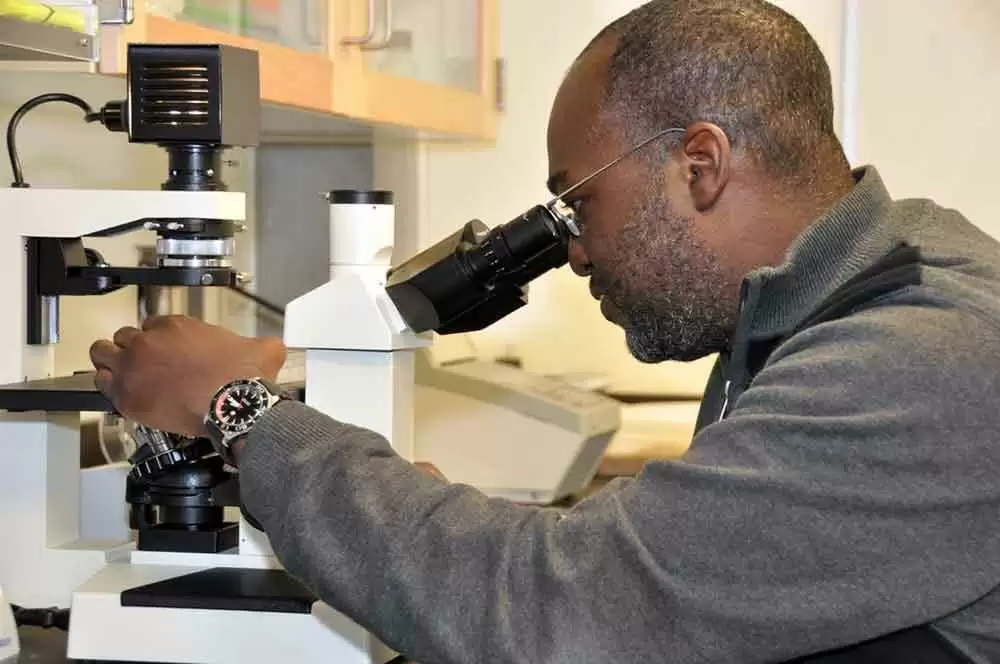
Celiac.com 11/23/2018 - The complex factors that lead to the development of celiac disease in a given individual are the subject of much research. The immune system, genetics and the environment (meaning factors in an individual’s life that would influence the development of disease) all play an important part in this process.
Current research on celiac disease focuses on the immune system; scientists are working to understand the exact chain of events that occur in the gut when gluten is introduced for the first time. Understanding these events could yield insight into treatments for celiac disease that interrupt this process. Celiac disease is the only autoimmune disorder where the trigger is known: gluten. Researchers use celiac disease as a model for studying the pathogenesis of other autoimmune diseases.
Celiac.com Sponsor (A12):
Other researchers are examining the role of environmental factors and the added risk they bring to an individual who already is at risk for celiac disease. These factors include the influence of breastfeeding, the timing of the introduction of cereals, intestinal infection as a precursor to celiac disease, cultural factors, geography, and more.
Genetic research has determined that there are two genetic haplotypes that are necessary for the development of celiac disease; an affected individual need only to have one of these genetic haplotypes to be at risk. These factors are HLA DQ2 and HLA DQ8. HLA stands for Human Leukocyte Antigen. Antigens are substances that produce an immune response—we have many antigens in our bodies that are supposed to do that. HLA are molecules that present on the surface of cells to help the immune system to distinguish antigens that are supposed to be in the body, versus antigens that aren’t.
While other genes may play a role in the process, we can conclude with virtual certainty that an individual who tests negative for DQ2 or DQ8 will not develop celiac disease. We also know that 30% of the US population has the genetic makeup for celiac disease.
While it is encouraging to see a surge of interest in celiac disease research, people with celiac disease have to make choices every day that affect their health, and knowing a bit more about the immune system may make this process easier. Myths about what it means to have an autoimmune disorder are common. Knowledge about this area can help one sort out the myths and find the facts about what it means to have celiac disease.
What Does the Immune System Do?
The immune system provides the human body with several levels of defense from foreign invaders like bacteria and viruses. The first layer of protection is our skin. If an invader finds its way into the body, however, the second level of defense mobilizes to destroy the invader before it can replicate. Some types of invaders already replicate and invade surrounding cells before the immune system can destroy them—and there is a sophisticated type of immune response to eliminate these types of invaders.
The most important decision that the immune system makes when it encounters an “invader” is to determine whether or not it is “self” (is it supposed to be in the human body?) or “non-self” (is this a virus or bacteria that will cause illness?). HLA helps the immune system by tagging cells as “self” or “non-self” to allow the immune system to attack the true invaders. In the case of celiac disease, HLA tags the antigen presenting cell as non-self, when it should be tagged as self.
The human body as a house
Think of the human body as a house. The exterior of the house (the roof, the brick, the door, and the windows) is like the skin of a human body, protecting everything inside. The house has an alarm system, to detect invaders. The alarm system is the body’s immune system. There is a cat inside the house, sleeping on the couch.
How is the immune system supposed to work?
If a burglar (who is not supposed to be in the house) comes to the side window and tries to break in, there may be a broken window, but the alarm sounds and the burglar runs away. Everything inside the house is safe.
How does the immune system work when someone has celiac disease?
The cat wakes up from its nap and gets a drink of water. The alarm goes off, when it’s not supposed to. The cat sets off the alarm every time it moves, but other than this, the alarm works perfectly, keeping out all of the true invaders.
In other words, the immune system of an individual with celiac disease is healthy and normal in every respect, save one. The presence of gluten, and only gluten, causes a malfunction of the immune system. In our example, the cat represents gluten—it is supposed to be in the house, yet every time it moves the alarm goes off. This means that removing gluten from the diet of a person with celiac disease returns their immune system to a normal and healthy state, equal to that of someone who does not have celiac disease.
Many people with celiac disease feel that they are immune compromised, which is not the case. If the house in our example represented someone with an immune compromised condition, the alarm would rarely if ever go off (invaders could enter the body without any resistance). For this reason, flu shots for people with celiac disease do not represent a concern (unless you are allergic to eggs) and people with celiac disease should receive the shot with the general population, and not the special populations who are immune compromised (the elderly, children, etc.).
When should gluten be introduced to a child at risk for celiac disease?
When a person with celiac disease has a baby, there is a great deal of concern regarding the child’s potential for developing celiac disease—this is understandable. One of the most troubling questions facing parents is when to introduce gluten to their child. It is a common recommendation to delay the introduction of gluten until one year of age. Unfortunately, this recommendation is based on wheat allergy, and not autoimmunity.
Fortunately, recent research published in the Journal of the American Medical Association has affirmed earlier research from Finland on this subject as well as what has been a common practice throughout Europe.
A protective window
Researchers at the University of Colorado recently announced the results of a 10 year study on the introduction of cereals in children at risk for celiac disease. Their study demonstrated that infants who received cereals containing gluten between four to six months of age were not as likely to develop celiac disease by the age of five as were children who received gluten containing cereals at younger and older ages. The infants who received cereals between one and three months of age were five times as likely to develop celiac disease, and children who received cereals after six months of age had an elevated risk for developing celiac disease, but not to the extent of the youngest age group.
Is it a gluten response?
Many parents are concerned about whether or not their child will have an autoimmune response to gluten when introduced to cereals. It may help to know that it typically takes six to nine months for a child to mount an autoimmune response to gluten—if celiac disease is to occur early in their life. Therefore, a response (such as diarrhea or vomiting) shortly after cereals are introduced or eaten is usually not related to celiac disease.
What about breast milk?
A mother with celiac disease needs to remain on the gluten-free diet throughout pregnancy and breast-feeding. However, it is a common misconception that breast-feeding moms who are not celiac should go on a gluten-free diet while nursing. Microscopic amounts of gluten are carried in breast milk, but it is not enough to harm a child. In fact, research from Finland shows that breast milk has a protective effect in the gut when gluten is introduced to a child. This research recommends that when introducing gluten between four and six months of age, breast feeding should continue during this time to confer an added immune benefit.
Understanding a bit more about the immune system may be helpful as you make decisions about your health, and the health of your family. It can be reassuring to know that the immune system of a person with celiac disease on the gluten-free diet is as healthy as an average person without celiac disease.



.webp.546d7e1134aadaa8b723e76970d209d3.webp)






Recommended Comments
There are no comments to display.
Create an account or sign in to comment
You need to be a member in order to leave a comment
Create an account
Sign up for a new account in our community. It's easy!
Register a new accountSign in
Already have an account? Sign in here.
Sign In Now